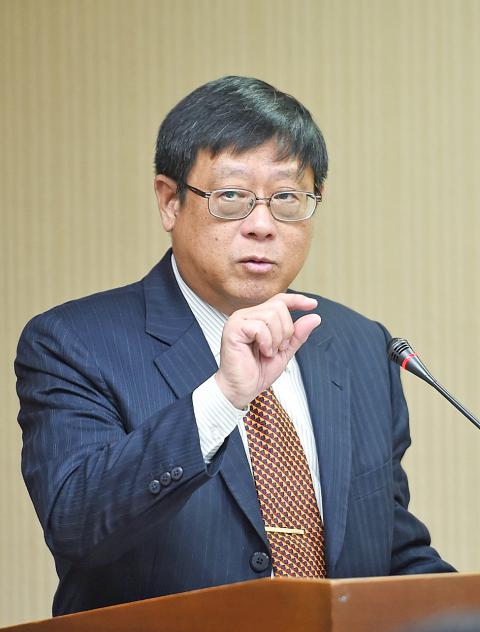The Environmental Protection Administration’s (EPA) proposed timetable to ban single-use plastic bags, utensils, cups and straws at all venues by 2030 needs more deliberation before being promulgated, EPA Minister Chang Tzi-chin (張子敬) said yesterday.
Chang made the remarks as he was grilled by several lawmakers on the planned ban on single-use straws.
Chang reported the agency’s achievements and plans for limiting the use of disposable plastic products at a meeting of the Legislative Yuan’s Social Welfare and Environmental Hygiene Committee.

Photo: Liu Hsin-de, Taipei Times
While then-EPA minister Lee Ying-yuan (李應元) in February last year announced a four-stage plan to ban disposable plastic products by 2030, the timetable was not backed by careful evaluation about potential problems and alternatives, Chang said.
The plan was produced by the agency’s marine waste disposal platform, which involved eight local environmental groups, said Chang, who served as EPA deputy minister for 13 years before being appointed as its minister in January.
Without cautious planning in advance, bans on single-use plastic products would incur more problems, he added.
For example, the agency has met many challenges after it in June last year proposed a draft ban on single-use plastic straws to dine-in customers at government agencies, public and private schools, department stores and fast-food chains, Chang said.
While the straw ban is to take effect in July, many lawmakers questioned whether stores that would be affected by it have prepared alternatives and why biodegradable straws would not be banned.
Biodegradable straws are eco-friendly only under certain composting conditions, but as the nation lacks a proper recycling system for such straws, they would mostly end up in incinerators, Chinese Nationalist Party (KMT) legislators Alicia Wang (王育敏) and Chiang Wan-an (蔣萬安) said.
Manufacturers have to obtain EPA certification to sell biodegradable straws, Chang said, adding that only one company has applied for certification so far.
Given inadequate recycling processes for biodegradable straws, the agency would assess whether to ban them by July next year, he said.
Democratic Progressive Party Legislator Huang Hsiu-fang (黃秀芳) asked whether the government’s policies to reduce plastic use since 2002 have been effective, citing Ministry of Economic Affairs data showing that the number of firms producing plastic wrappings and bags has been rising.
The amount of consumed plastic shopping bags is decreasing, but that of plastic wrappings is not, probably due to a surge in online shopping, EPA Department of Waste Management Director-General Lai Ying-ying (賴瑩瑩) said.
The agency would encourage e-commerce operators to propose plans for reducing unnecessary packaging waste and establish guidelines later, she said.

Taiwanese can file complaints with the Tourism Administration to report travel agencies if their activities caused termination of a person’s citizenship, Mainland Affairs Council Minister Chiu Chui-cheng (邱垂正) said yesterday, after a podcaster highlighted a case in which a person’s citizenship was canceled for receiving a single-use Chinese passport to enter Russia. The council is aware of incidents in which people who signed up through Chinese travel agencies for tours of Russia were told they could obtain Russian visas and fast-track border clearance, Chiu told reporters on the sidelines of an event in Taipei. However, the travel agencies actually applied

Japanese footwear brand Onitsuka Tiger today issued a public apology and said it has suspended an employee amid allegations that the staff member discriminated against a Vietnamese customer at its Taipei 101 store. Posting on the social media platform Threads yesterday, a user said that an employee at the store said that “those shoes are very expensive” when her friend, who is a migrant worker from Vietnam, asked for assistance. The employee then ignored her until she asked again, to which she replied: "We don't have a size 37." The post had amassed nearly 26,000 likes and 916 comments as of this

New measures aimed at making Taiwan more attractive to foreign professionals came into effect this month, the National Development Council said yesterday. Among the changes, international students at Taiwanese universities would be able to work in Taiwan without a work permit in the two years after they graduate, explainer materials provided by the council said. In addition, foreign nationals who graduated from one of the world’s top 200 universities within the past five years can also apply for a two-year open work permit. Previously, those graduates would have needed to apply for a work permit using point-based criteria or have a Taiwanese company

The Shilin District Prosecutors’ Office yesterday indicted two Taiwanese and issued a wanted notice for Pete Liu (劉作虎), founder of Shenzhen-based smartphone manufacturer OnePlus Technology Co (萬普拉斯科技), for allegedly contravening the Act Governing Relations Between the People of the Taiwan Area and the Mainland Area (臺灣地區與大陸地區人民關係條例) by poaching 70 engineers in Taiwan. Liu allegedly traveled to Taiwan at the end of 2014 and met with a Taiwanese man surnamed Lin (林) to discuss establishing a mobile software research and development (R&D) team in Taiwan, prosecutors said. Without approval from the government, Lin, following Liu’s instructions, recruited more than 70 software